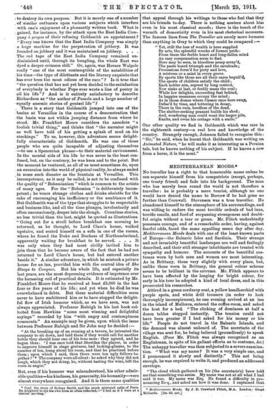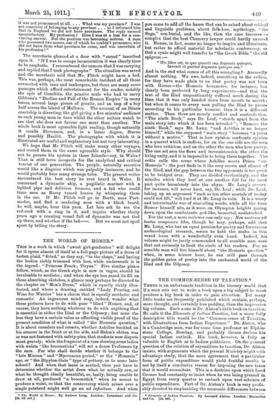MEDITERRANEAN MOODS.*
Be delighted to see his own form so often reflected.—" I feel as if I were at a • Mediterranean Moods. By J. E. Crawford Flitch, M.A. London : Grant
No traveller has a right to that honourable name unless he can separate himself from his compatriots (except, perhaps, one trusty friend) and fade into his background. The man who has merely been round the world is not therefore a traveller : he is probably a mere tourist, although no one would have denied the name to Borrow if he had gone no further than Cornwall. Stevenson was a true traveller. He abandoned himself to the atmosphere of his surroundings, and was willing to endure the most terrible ordeals of bad inns, terrific smells, and food of surpassing strangeness and doubt- ful origin without a tear or groan. Mr. Flitch undoubtedly
possesses courage, and of a remarkable order, having, against fearful odds, faced the same appalling menu day after day. Mediterranean Moods deals with one of the least-known parts of Europe—the Balearic Isles and Sardinia. Their strange and not invariably beautiful landscapes are well and feelingly described, and their still stranger inhabitants are treated with
sympathy and humour. The accounts of the beautiful cos- tumes worn by both men and women are most interesting. As in Brittany, these vary slightly with every place, but, unlike those worn in Brittany, the general colour scheme seems to be brilliant in the extreme. Mr. Flitch appears to have been affected by the longing for bright colour, for
early in his tour he adopted a kind of local dress, and in this
prosecuted his researches.
Attired in a green corduroy coat, a yellow handkerchief with purple spots, and white drill trousers (in order to look thoroughly inconspicuous), he one evening arrived at an inn in the island of Mallorca, entered the coffee-room, and asked
the host for a bed. "The clicking of dominoes at half a dozen tables stopped instantly. The tension could not
have been greater if I had asked for his money or his life." People do not travel in the Balearic Islands, and the demand was almost unheard of. The secretario of the village was sent for, he being believed (groundlessly) to speak English. (Poor Mr. Flitch was always recognised as an Englishman, in spite of his gallant efforts as to costume, &c.) The unhappy traveller was then subjected to a severe examina- tion. " What was my name ? It was a very simple one, anal I pronounced it slowly and distinctly." This not being enough, he was required to write it, and produced an addressed envelope.
" The cloud which gathered on his (the secretario's) brow told me that something was amiss. My name was not at all what I had said it was. My name was Esq. He found a difficulty in pro- nouncing Es-q., and asked me how it was done. I explained that it-was not pronounced at all. . . . What was my province P / was not conscious of belonging to any province ... . so I informed him that in England we did not have provinces. The reply seemed unsatisfactory. My profession? Here I was at a loss for a con- vincing answer. But the position was becoming serious. A man who possessed two names, one of which he couldn't pronounce, who did not know from what province he came, and was uncertain of his profession l"
The secretario glanced at a door with " cartel" inscribed upon it. "If I was to escape incarceration it was clearly time to be emphatic. I remembered the camera that I was carrying and replied that I took photographs." The situation was saved and the secretario said that Mr. Flitch might have a bed. This was, perhaps, the most remarkable incident of all those connected with inns and innkeepers, but there are many more passages which afford entertainment for the reader, notably the epic of Conchita, the pensive mule who had to carry Gibbons's "Decline and Fall of the Roman Empire " in many tomes, several large pieces of granite, and an imp of a boy half across the island of Mallorca. The account of an Ibizan courtship is diverting, the girl giving a five minutes' audience to each young man in turn whilst the other suitors watch to see that she does not favour one more than another. The whole book is most agreeable light reading, though naturally it recalls Stevenson, and, in a lesser degree, Sterne and possibly Hazlitt. The photographs with which it is illustrated are useful and explanatory but not very interesting.
We hope that Mr. Flitch will make many other voyages, and record them in the same agreeable style. Why should not he pursue his system in these Islands—say, in Wales P
That is still terra incognita for the analytical and critical tourist of our generation. The people, naturally secretive would like a disguise which was palpably insincere, and he
would probably hear many strange tales. The present writer encountered the best story be ever heard in Wales. It
concerned a dynamite ship, a pugilistic mariner with a lighted pipe and delirium tremens, and a lad who could
tame men as Rarey tamed horses by whispering them in the ear. If Mr. Flitch will go to Borth, near Port- madoc, and find a seafaring man with a black beard, he will, maybe, hear this yarn. Let him ask to see the red-rock with a ring in it, and inquire whether thirty years ago a coasting vessel full of dynamite was not tied up there, and whether if the lad—. But we must not spoil sport by telling the story.











































 Previous page
Previous page